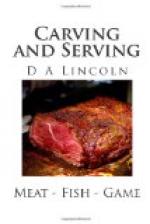“Mrs. Lincoln, nothing daunted by the legion of cook-books already in existence, thinks there is room for one more. Her handsome and serviceable-looking volume seems to contain everything essential to a complete understanding of the culinary art. The Introduction of thirty-five pages discusses such subjects as cooking in general, fire, fuel, management of a stove, the various processes of boiling, stewing, baking, frying, roasting, and broiling, with full explanation of the chemical theory underlying each and distinguishing them; also hints on measuring and mixing, with tables of weights, measures, and proportions; of time in cooking various articles, and of average cost of material. One who can learn nothing from this very instructive Introduction must be well-informed indeed. Following this comes an elaborate and exhaustive chapter on bread-making in all its steps and phases. To this important topic some seventy pages are devoted. And so on through the whole range of viands. Exactness, plainness, thoroughness, seem to characterize all the author’s teachings. No point is neglected, and directions are given for both necessary and luxurious dishes. There are chapters on cooking for invalids, the dining-room, care of kitchen utensils, etc. There is also a valuable outline of study for teachers taking up the chemical properties of food, and the physiological functions of digestion, absorption, nutrition, etc. Add the miscellaneous questions for examination, the topics and illustrations for lectures on cookery, list of utensils needed in a cooking-school, an explanation of foreign terms used in cookery, a classified and an alphabetical index,—and you have what must be considered as complete a work of its kind as has yet appeared.”—Mirror, Springfield, Ill.
“In answer to the question, ‘What does cookery mean?’ Mr. Ruskin says: ’It means the knowledge of Circe and Medea, and of Calypso and of Helen, and of Rebekah and of all the Queens of Sheba. It means knowledge of all fruits and balms and spices, and of all that is healing and sweet in fields and groves, and savory to meals; it means carefulness and inventiveness, and readiness of appliances; it means the economy of your great-grandmothers and the science of modern chemistry; it means much tasting and no wasting; it means English thoroughness, and French art, and American hospitality.’ It is not extravagant to say that as far as these mythological, biblical, and practical requirements can be met by one weak woman, they are met by Mrs. Lincoln. And to the varied and extensive range of knowledge she adds an acquaintance with Milton and with Confucius, as shown by the apt quotations on her titlepage. The book is intended to satisfy the needs and wants of the experienced housekeeper, the tyro, and of the teacher in a cooking-school. In its receipts, in its tables of time and proportion, in its clear and minute directions about every detail of kitchen and dining-room, it has left unanswered few questions which may suggest themselves to the most or the least intelligent.”—The Nation.




